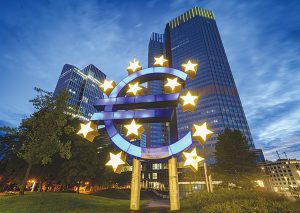Bloomberg
Europe’s banks waited more than a decade for higher interest rates to make lending more profitable again. Now some governments are threatening to spoil the party.
As the European Central Bank (ECB) prepares to raise rates on Thursday, politicians from Madrid to Warsaw are calling for mortgage holidays and bank taxes to shield consumers from higher borrowing costs and record inflation. Poland allowed home owners to suspend mortgage payments. Spain is mulling a 5% tax on bank fees and interest charges. Hungary already introduced a bank tax.
Tapping banks to help soften the impact of surging inflation is popular in a region long critical of the finance industry, particularly after many of them were bailed out with taxpayer money in the financial crisis. But for lenders already struggling with the fallout from sanctions against Russia, such moves could prolong a lost decade during which they had to cede market share to their larger Wall Street peers and struggled to make much-needed investments into technology.
“We need to share the burden of this crisis justly, and not like the last one, which fell on top of the most vulnerable,†Spanish Prime Minister Pedro Sanchez said as he unveiled his surprise tax.
Spain’s proposal, aimed at raising 3 billion euros ($3.1 billion) for measures to soften the impact of soaring inflation, wiped out about 6 billion euros in market value for the top five listed lenders on the day.
The government has no plans to raise the corporate tax rate for banks and is instead leaning towards applying a VAT-style duty for service and interest charges, Bloomberg
reported.
European lenders have long blamed ultra-low and even negative rates for their lackluster profitability.
Higher interest rates set by the ECB would boost lending revenue at the region’s ten biggest banks by about 5 billion euros this year, analysts have estimated.
 The Gulf Time Newspaper One of the finest business newspapers in the UAE brought to you by our professional writers and editors.
The Gulf Time Newspaper One of the finest business newspapers in the UAE brought to you by our professional writers and editors.
